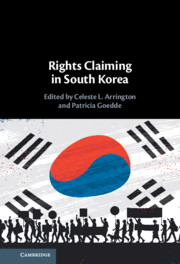Book contents
- Rights Claiming in South Korea
- Rights Claiming in South Korea
- Copyright page
- Dedication
- Contents
- Contributors
- Acknowledgments
- Abbreviations
- Introduction Rights in Action
- Part I Rights in Historical Perspective
- Part II Institutional Mechanisms for Rights Claiming
- Part III Mobilizing Rights for the Marginalized
- Part IV Shaping Rights for New Citizens and Noncitizens
- 13 The Rights of Noncitizenship
- 14 Claiming Citizenship
- Conclusion Findings and Future Directions
- Index
- References
14 - Claiming Citizenship
Rights Claiming and Recognition for North Koreans Entering South Korea
from Part IV - Shaping Rights for New Citizens and Noncitizens
Published online by Cambridge University Press: 17 April 2021
- Rights Claiming in South Korea
- Rights Claiming in South Korea
- Copyright page
- Dedication
- Contents
- Contributors
- Acknowledgments
- Abbreviations
- Introduction Rights in Action
- Part I Rights in Historical Perspective
- Part II Institutional Mechanisms for Rights Claiming
- Part III Mobilizing Rights for the Marginalized
- Part IV Shaping Rights for New Citizens and Noncitizens
- 13 The Rights of Noncitizenship
- 14 Claiming Citizenship
- Conclusion Findings and Future Directions
- Index
- References
Summary
This chapter explores what border-crossing tells us about the linkage between citizenship and rights-claiming by examining the experiences of North Koreans who resettle in South Korea, focusing on the security screening process that occurs immediately after they arrive on South Korean soil. Although North Koreans are often described as having “automatic citizenship” in the South under both constitutional and communitarian conceptions of citizenship, that claim is only partially accurate. I show that North Koreans must exhibit considerable agency to claim citizen-standing, and their rights are heavily circumscribed and contingent on state recognition of their identity throughout the screening process. The chapter elucidates how marginalized citizens claim rights at a site of maximal state power (Korea’s deep and securitized border) and illuminates how the gap between legal recognition of rights and their instantiation in state practice can render the claims process extended and arduous even for individuals whose citizen-standing is already theoretically established.
- Type
- Chapter
- Information
- Rights Claiming in South Korea , pp. 299 - 317Publisher: Cambridge University PressPrint publication year: 2021

